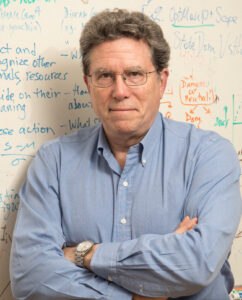
- This event has passed.
Science in Medicine Annual Lecture featuring David Anderson, PhD
May 11, 2023 @ 11:00 am - 12:00 pm

“Dynamic neural coding of social behavior in the hypothalamus”
In-Person Location: Orin Smith Auditorium – South Lake Union Campus
Director, Tianqiao and Chrissy Chen Institute for Neuroscience
Tianqiao and Chrissy Chen Leadership Chair
Seymour Benzer Professor of Biology, California Institute of Technology
Abstract
The hypothalamus controls both physiological homeostasis and innate survival behaviors such as mating, aggression and predator defense. The prevailing view is that the circuitry controlling the latter behaviors is primarily organized as a series of “labeled lines,” in which specific cell types control specific behaviors through dedicated circuitry. I will present evidence that population coding and neural dynamics play a previously unsuspected and important role in controlling social behaviors in the hypothalamus. More specifically, we have found that line attractor-like dynamics in the hypothalamus may represent a neural mechanism for encoding scalable, persistent motive states that underly such behaviors. These findings suggest that attractor dynamics may play a much broader role in controlling behavior, beyond the primarily cognitive functions mediated by the cortico-hippocampal areas in which they have been described previously.
Biography
David J. Anderson is the Seymour Benzer Professor and TianQiao and Chrissy Chen Leadership Chair in the Division of Biology and Biological Engineering at the California Institute of Technology in Pasadena, where he has been on the faculty since 1986. He is currently the Director of the TianQiao and Chrissy Chen Institute for Neuroscience at Caltech, and an Investigator of the Howard Hughes Medical Institute. Dr. Anderson received his AB from Harvard College in 1978 Summa Cum Laude, received his PhD in Cell Biology in 1983 with the late Günter Blobel, a Nobel Laureate at The Rockefeller University, and did postdoctoral work with Richard Axel, a Nobel Laureate, at Columbia University from 1983-1986. He is an alumnus of the 1979 MBL Neurobiology Course. Dr. Anderson’s research career has spanned multiple topics in neuroscience, from neural development to angiogenesis, to the neural circuits that mediate innate emotional behaviors, such as fear and aggression. His key scientific discoveries include: 1) the first report of the isolation of a self-renewing multipotential stem cell for neurons and glia from a vertebrate embryonic nervous system; 2) the identification of mammalian achaete-scute homologs (Ascl1) and the neurogenins, vertebrate neuronal determination genes now used to create neurons from fibroblasts for therapeutic purposes; 3) the discovery that embryonic arteries and veins are already genetically distinct before the establishment of heartbeat; 4) the discovery of genetically identified neurons that are necessary and sufficient to promote aggression in the mammalian brain. Anderson has published over 225 primary research articles and is the co-author with Caltech colleague Ralph Adolphs of The Neuroscience of Emotion: A New Synthesis (2018, Princeton University Press), and the author of The Nature of the Beast: How emotions guide us (2022, Basic Books). Dr. Anderson has trained over 50 PhD students or postdoctoral fellows. He was elected to the American Academy of Arts and Sciences (2002), the US National Academy of Sciences (2007), and is a recipient of the 2017 Perl-UNC Neuroscience Prize and the 2018 Edward M. Scolnick Prize in Neuroscience from MIT. He was also selected as an Allen Distinguished Investigator in 2010. Dr. Anderson played a key role as an adviser to the late Paul Allen in the founding of the Allen Institute for Brain Sciences and the creation of the Allen Brain Atlas, and continues to serve as an adviser to that Institute. He has also served on two working groups for the NIH’s BRAIN (Brain Research through Advancing Innovation in Neurotechnology) Initiative.
Dr. Anderson has engaged in the public communication of science through several channels. He published an OpEd in the New York Times, The Alchemy of Stem Cell Research (July 15, 2001), has delivered a TEDx talk (“Your Brain is More than a Bag of Chemicals,” 2013) which has received over 1.5 million views, has appeared on NPRs TED Radio Hour to discuss the talk, the National Edition of NPRs All Things Considered with Jon Hamilton (2019), and two episodes of Charlie Rose’s Brain Series. His work on aggression in fruit flies has been profiled in the NY Times (“To study aggression, a fight club for flies,” Feb. 3rd 2014).
Dr. Anderson has engaged in community building in his role as the Director of the Chen Institute for Neuroscience at Caltech, by establishing a campus-wide nexus for the neuroscience community through retreats, socials, symposia and workshops. He has also contributed to Diversity, Equity and Inclusion efforts through the establishment of several programs through the Chen Institute, including 1) the annual Diversity and Inclusion Awards; 2) the Diverse Minds Seminar Series; 3) the BrainWAVE program, a summer undergraduate research program for under-represented minority (URM) students; 4) the Chen Institute Director’s Fellowship, a special 2-year graduate fellowship to support talented students from under-represented groups in the neurosciences at Caltech.